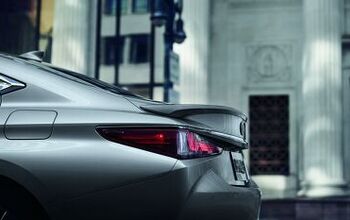Mid-Size Sedan Sales War: Toyota Wants To Retain Camry Lead By Any Means Necessary
This year’s sales race in the mid-size segment is one of the most competitive in recent memory. 5 of the top 10 best-selling cars in America are mid-sizers, and automakers are pulling out all the stops in an effort to unseat the Toyota Camry from its standing as America’s best-selling car. But Toyota isn’t going down without a fight.
Sales figures as of May show the Camry in a decent lead over the #2 Honda Accord, ahead by nearly 16,000 units. But the Camry, which is down by 5.5 percent year-to-date, and incentive spending is nearly double that of the Accord, according to figures from TrueCar compiled by Automotive News.
At $2,750 per unit, Camry incentives are up by 38 percent, while the Accord’s $1400 incentive is down by 40 percent. The new model changeover explains the big drop in Accord spending, but the Camry’s incentives (like 0 percent financing for 60 months) is part of a broader plan that includes a big fleet sales program (current making up 20 percent of sales, and expected to level off to 15 percent, versus the Accord’s 1 percent figure) to help move metal. Toyota is gunning for 400,000 units in 2013 if necessary, a figure that may be hard to match production wise for other auto makers. Then again, one has to wonder how profitable the Camry will end up being when there’s such a relentless drive for volume at all costs.
Other challengers, like the Nissan Altima, Ford Fusion, Chevrolet Malibu and Hyundai Sonata, seem to be relying on high fleet sales, heavy incentives or a combination of both, to keep their numbers up. The Fusion’s numbers are particularly interesting. Despite sales being up nearly 22 percent year-to-date and Ford making noise about capacity issues, fleet numbers and incentive spending remains relatively high. Ford is spending about $2,300 per car, while fleet mix runs at 34 percent.
Even the Chevrolet Malibu, regarded as the dog of the segment, has a 39 percent fleet mix, despite conventional wisdom holding that GM is merely dumping these cars on daily rental fleets as a means of moving them off the lot. Still, Malibu sales are down 18.9 percent so far, and it will be interesting to see how things progress as sales of the refreshed model loom ever closer.
More by Derek Kreindler
Latest Car Reviews
Read moreLatest Product Reviews
Read moreRecent Comments
- ToolGuy There was a time when in a place called America there were roads, and they were paved, and they were paved smoothly enough for a vehicle like this. Perhaps our next President will bring back that concept.
- ToolGuy I suppose I will listen before commenting. (TG, what a fair-minded dude!)
- ToolGuy "The technology is much more advanced to be better than a role model driver,”• Do any of you know what a "role model driver" is? No, I guess you wouldn't. 😉
- ToolGuy I might be Batman.
- Lou_BC Well, I'd be impressed if this was in a ZR2. LOL


































Comments
Join the conversation
Where I live (sw louisiana) the Camry is being offered at 0% for 72 months.
"Other challengers, like the Nissan Altima, Ford Fusion, Chevrolet Malibu and Hyundai Sonata, seem to be relying on high fleet sales, heavy incentives or a combination of both, to keep their numbers up. The Fusion’s numbers are particularly interesting. Despite sales being up nearly 22 percent year-to-date and Ford making noise about capacity issues, fleet numbers and incentive spending remains relatively high. Ford is spending about $2,300 per car, while fleet mix runs at 34 percent." -- Don't know why DK included the Sonata in the remark on "high fleet sales" when the Sonata's fleet % (17%) is well below the others, much less below that for the Camry. As for the Fusion's fleet %, 41% of that is to govt./corporate fleet while 92% of Camry fleet sales is to rental. Take into account the total no. of Camry sales and that's a lot of Camrys being pumped into rental fleet (pretty much close to the total no. of Malibus that go into rental fleet). Also, the Fusion's ATP is nearly $2,800 higher than for the Camry (the Camry's ATP is not only a good but lower than for the Fusion, but the Accord, Altima, Optima, etc. as well).